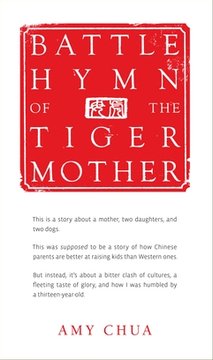
12 Jan 2011 16:37:11
The book "Battle Hymn of the Tiger Mother," is a chatty, witty, intimate memoir of how she raised two daughters in hyper-severe Chinese style, despite the surrounding children of permissive American parents.
Chua's father, a leading theorist of advanced mathematics, gave her a model for perfectionism. In eighth grade, she placed second in a history contest. Someone else was named best all-around student. She invited her family to the ceremony.
"Afterward," she writes, "my father said to me: `Never, never, disgrace me like that again.'"
She pursued that model. Though generous with family fun and affection, she denied her daughters, Sophia and Louisa (Lulu), experiences that are important to many young Americans: no TV, no pets, no computer games, no sleepovers, no play dates, no grades under A, no parts in school plays, no complaints about not having parts in school plays, no choice of extracurricular activities, nothing less than top places in any school class except gym and drama, no musical instruments except piano or violin.
Compulsory for the girls: speed drills in math, exclusive use of the family's Chinese dialect at home, lessons in Mandarin Chinese, long hours of music practice closely coached by Chua, with double sessions on weekends and no break on vacations.
Music has been a primary concern — Bach, Mozart, Beethoven, Debussy, Dvorak. The program worked, in part. Sophia won a contest at 14 that brought her a piano recital at Carnegie Hall in New York City.
Lulu, at age 6, didn't want to learn to play the violin. Chua bullied her with threats of a spanking and a missed dinner. Good teachers helped Lulu develop an affinity with the instrument and she became concert master of a youth orchestra.
Lulu's rebellion climaxed on a vacation in Russia. At a cafe in the GUM, the big shopping mall on Moscow's Red Square, she refused Chua's command to just taste the caviar — and smashed a glass in defiance.
Chua's father, a leading theorist of advanced mathematics, gave her a model for perfectionism. In eighth grade, she placed second in a history contest. Someone else was named best all-around student. She invited her family to the ceremony.
"Afterward," she writes, "my father said to me: `Never, never, disgrace me like that again.'"
She pursued that model. Though generous with family fun and affection, she denied her daughters, Sophia and Louisa (Lulu), experiences that are important to many young Americans: no TV, no pets, no computer games, no sleepovers, no play dates, no grades under A, no parts in school plays, no complaints about not having parts in school plays, no choice of extracurricular activities, nothing less than top places in any school class except gym and drama, no musical instruments except piano or violin.
Compulsory for the girls: speed drills in math, exclusive use of the family's Chinese dialect at home, lessons in Mandarin Chinese, long hours of music practice closely coached by Chua, with double sessions on weekends and no break on vacations.
Music has been a primary concern — Bach, Mozart, Beethoven, Debussy, Dvorak. The program worked, in part. Sophia won a contest at 14 that brought her a piano recital at Carnegie Hall in New York City.
Lulu, at age 6, didn't want to learn to play the violin. Chua bullied her with threats of a spanking and a missed dinner. Good teachers helped Lulu develop an affinity with the instrument and she became concert master of a youth orchestra.
Lulu's rebellion climaxed on a vacation in Russia. At a cafe in the GUM, the big shopping mall on Moscow's Red Square, she refused Chua's command to just taste the caviar — and smashed a glass in defiance.

